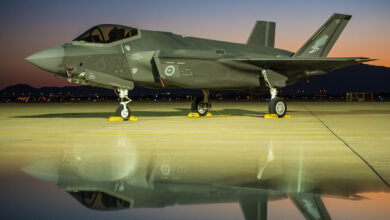Raytheon has been awarded a $77,392,758 contract to produce 570 Small Diameter Bomb II glide bombs and associated equipment for the U.S. Air Force, the U.S. Department of Defense said in a press release.
“This contract provide for low rate initial production for 570 SDB II Lot 4 munitions, 398 SDB II Lot 4 single weapon containers, 126 SDB II Lot 4 dual weapon containers, 20 Production Reliability Incentive Demonstration Effort captive vehicles, 24 SDB II Lot 3 weapon load crew trainers/conventional munitions maintenance trainers, and other data,” the Tuesday, February 27 release said.
Work is expected to be complete by July 31, 2020 and will be performed in Tucson, Arizona.
Precision stand-off strike glide bomb
The GBU-39 Small Diameter Bomb is a 250-pound precision-guided glide bomb with a stand-off range of more than 40 nautical miles (74 km). It uses a GPS-aided inertial navigation system to attack fixed or stationary targets.
It is designed to enable aircraft to carry a higher number of smaller, more accurate bombs. Many U.S. Air Force aircraft – including the F-15E, F-16, F-117, B-1, B-2, F-22 and F-35 – can carry a pack of four GBU-39 SDBs in place of a single 2,000-pound bomb. The GBU-39 was launched from F-22s to strike Taliban drug factories in Afghanistan in November.
A variant of this weapon, the GBU-39B/B Laser Small Diameter Bomb, integrates the JDAM’s semi-active laser, enabling the bomb to hit targets moving at up to 80 km/h (50 mph) and has been fielded by the U.S. Special Operations Command since 2014.
The variant ordered on Tuesday – GBU-53/B Small Diameter Bomb II – can only be carried by the F-15E and F-22, although the F-35 will be able to carry the weapon after a 2022 software upgrade. This variant adds a tri-mode seeker that enables radar and infrared homing, as well as semi-active laser guidance, and reportedly features automatic target recognition for strikes against mobile targets.
On January 3, Boeing was awarded an almost $194 million contract to produce 6,000 GBU-39 Small Diameter Bombs for the U.S. Air Force and for sale to six foreign governments. On December 8, Boeing was awarded a $10.5 million contract to produce GBU-39B/B Laser Small Diameter Bombs for the U.S. Air Force.
On November 27, General Atomics was awarded a $17.5 million contract to integrate the Laser Small Diameter Bomb onto the MQ-9 Reaper drone, but the following day it published a correction, saying the contract “has not yet been awarded.” The integration would give the Reaper a 75-km stand-off weapons capability and reduce the U.S. Air Force need for more expensive and dangerous manned missions.












